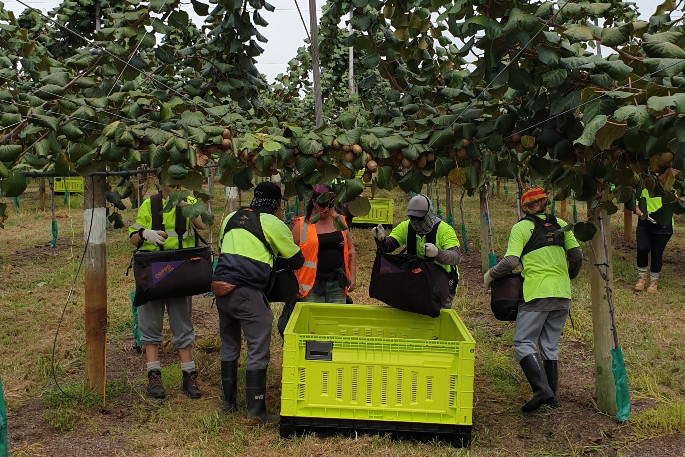The kiwifruit harvest has begun in the Bay of Plenty, with picking taking place from Opotiki to Katikati over the coming days.
The 2021 season is forecast to be another record-breaking year with more kiwifruit produced than ever before, overtaking last year's record of 157 million trays of green and gold.
On average, each tray contains around 30 pieces of kiwifruit.
The gold variety is usually picked first, followed by green kiwifruit in late March. Harvest peaks in mid-April and runs through until June.
More than 80 per cent of New Zealand's kiwifruit are grown in the Bay of Plenty across 10,000 hectares of orchards.
Nikki Johnson, CEO of New Zealand Kiwifruit Growers Inc, says the Bay is shaping up to produce high quality kiwifruit, which means consumers can anticipate a great tasting product off the supermarket shelves.
The forecast record crop means that there are a lot of jobs available for picking and packing. Around 20,000 seasonal workers will be required to pick and pack the crop across the region.
With border closures reducing the number of backpackers and Pacific Islanders from the RSE scheme, the industry will welcome even more Kiwis to work in the industry.
'The kiwifruit industry offers well paid jobs across a variety of roles,” says Nikki. 'There's a great team environment and you can have fun while you work and meet people from all around New Zealand.”
Almost all packhouses have told NZKGI that they will be paying at least the living wage of $22.10 per hour. Kiwifruit picking is also expected to exceed the living wage, with an average of $24 per hour paid last year when the minimum wage was $18.90.
Information on job opportunities can be found on the NZKGI website, or on the Facebook page KiwifruitJobsNZ.
Kiwifruit is New Zealand's largest horticultural export and a booming industry. The industry contributed $1.5 billion to the Bay of Plenty in 2020, and a 2017 University of Waikato report forecasts the industry to add more than 14,000 jobs to the region's economy by 2030.

